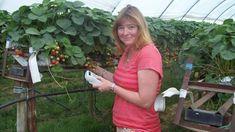
New research has shown UK strawberry growers could cut their water usage by almost a half while remaining commercially strong.
Substrate strawberry growers have long suspected that they have been over watering their crops but many growers irrigate to 20 per cent run-off with the aim to ensure plants have access to enough water and keep EC levels at an optimum in the substrate.
Recent small scale experimental work at East Malling Research showed that irrigation can be reduced by 45 per cent on Sonata compared to a typical growers standard irrigation programme, while still maintaining fruit yield and improving quality.
A trial is underway at Gaskains Farm, Selling, Kent to develop these small-scale experimental results into commercial reality for growers. Treatments that reduce water use by 20 per cent and 50 per cent compared to the grower standard are being applied to the everbearing variety Velvet grown in 100 per cent peat and the June bearing variety Sonata grown in 100 per cent coir.
At Gaskains two methods are being used, one a hand held device (WET sensor from Delta-T Devices Ltd) that measures substrate moisture and EC and the other a leave alone probe that regularly measures substrate moisture and sends data remotely to a PC (Enviroscan from Sentek Sensor Technologies).
Rupert Carter, head of technical for Total Berry, said: "As part of our group technical strategy we see sustainability and resource management as priorities. In a berry production unit water is arguably the most vital resource. We need to develop efficient water management systems and challenge current practices."
Gaskains’s Charles Gaskain said: “This work is very important from both an environmental and financial perspective. The trial is not with out its risks but the results so far are promising.”
The company said results so far have been “very encouraging” and are already benefiting from reduced water and fertilizer use. Additional benefits are expected to include improved fruit firmness, reduced bruising and increased sugars.
Total Berry’s research agronomist Dr Lindrea Latham stated that the results so far suggested that the water reduction treatments had not affected yield or fruit quality.



